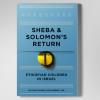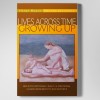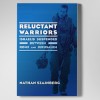Written 8/8/06: the Lebanon Conflict
On Thursday a.m., before the harrowing trip into Katyusha land of Kiryat Shemona, I visited my friend Eliaz Cohen, a poet and a delightful human. He is called up for emergency reserves during this northern war, replacing some of the younger boys who have been sent up north, into Lebanon, Hezbollaland.
Eliaz insists on giving phone directions in Hebrew. He thinks this will improve my language skills, as directions by phone are more difficult. Directions to his outpost at the edge of Jenin, go something like this: Go towards Afula, but stop short after Junction Megiddo (that place where the last battle of the Apocalypse will take place between the children of light and of darkness) to Junction Sargel. Turn right on Sargel road (“Ruler” road, as it is supposedly straight as a …..). When I get to this village (an Arab name), DON’T TURN THERE, when I get to that village, (another arab name DON’T TURN THERE, ibid. for the next few villages. When I get to a sign saying Msof M’atnim (which I later learn means, “Collection place for cargo”), GO, BUT DON’T GO TO THE END!
Well, by the time I see the Masof M’atnim sign I reach the end. It is truly a deadish end, with a massive orange gate cutting the road on an oblique, some five or such meters high, with barbed wire atop and electrified. It also warns not to cross in several languages. I call Eliaz. He, from his observation post, asks if “Are you driving a little silver car” (this Hyundai Getz, a Korean-made imitation of a Yugo).
“Yes.”
“Go back,” he says. “Go back slowly.”
“But there are spikes behind me prevent me from backing up.”
“Go left onto the side road.”
But it says “One way,” I explain.
“No one will ticket you,” he promises.
I turn around. Slowly. I see Eliaz waving from his observation point, phone to ear. After a few yards, I see the entrance to the base.
I have brought goodies — cookies, much soda. I asked Maurice, the “hotelier” at the shoddy Green Hotel in Netanya where I stay sometimes, and who hosts many military groups, what drinks to get for my soldier friends. He pulls out various bottles, most of which are brightly colored, sugared and carbonated, then a few bottles of cold water. Ziv, the physicist, on duty with Eliaz later tells me that gift-bearers such as I are all called “Dodahs,” “aunts,” regardless of gender. I respond that my mother would thank him for this.
Eliaz has become woolier since I last saw him. What was a crown of curls that gave him a tonsured look, has grown voluminously. A grizzled beard announces that he is in mourning for the Temple. Today is the fast day, but I know this beforehand and say that the goodies are for later. He will fast all day, unless there is an “action.” This poet greets me with a great hug. His breath is sour from his Temple-mourning. He likely spent last night sitting on the ground with fellow soldiers, reading Lamentations and talking about the Temple.
But, today, we talk about other matters.
He welcomes me to his Kafkaesque world. Like the castle, we enter a confusing maze of a building that sits at the border to the Palestinian Authority’s place of authority, separating one Israeli Arab village (perhaps pronounced “Mukbala”) from another (Jalaba, I recall) in Palestinian turf. But the villagers seem to be highly related to each other, with cousins from each traveling through this maze to visit the other.
Since the Northern war (and Gaza kidnapping and murder of two Israeli soldiers in Israel), Israel has slow down traffic across this transfer area: now, only emergency supplies and personal emergencies (including visiting one’s grandmother, attending a cousin’s wedding) permit transit.
Eliaz gives me an initial quick tour, but we fall to work for the next 3.5 hours — writing and thinking and talking. We are translating his poems into English. Words and ideas seem to transport us.
Yet, here is the basic setting upon which we worked. The transit building is two levels. The Poet and Physicist guard with their M16’s on a grid of concrete catwalks above the single guard below who is in a bulletproof cage. Those coming from Israel to cross to Palestinian areas have an easy route, short, with the exception of the sad fellow we saw at the end of the day, who was not pleased with returning to his Palestinian village. More Later.
From the Palestinian side, the route is more Kafkaesque. First, you put your luggage, bags and such aside and they travel through a luggage machine such as you find at airports. Now, divorced from chattel, you face cameras, show your ID card, state reason for entering Israel. The encased guard talks via TV and checks in his computer for identification. The Physicist and Poet hear from above. Today, a quiet day, this initial check brings you down a corridor to the guard booth for a face-to-face interview. But, on busy days, or days with reports of possible terrorist crossings, the path from initial gate to the guard booth is marked by multiple doors that can be closed in emergence. Even as we left, Eliaz pointed out, it is a maze to get out of the building. A spool of silk or thread is needed, preferably given by a Greek goddess, to find egress. Goddesses seem in short supply hereabouts, so I settle for a good soldier guide.
The upper level we are in would be a good hothouse, a place for hydroponic tomatoes and such. Instead, it is concrete, and at best, has grown Eliaz’s locks. We sit in two rollabout, one-armed desk chairs; each has springy backs that have felt too many a back. Each back lists to the side a bit, has little spring in it. The signs of many coffees and various meals mark the chair fabric. Even the chairs are disabled here, war-worn. Three duffle bags lie on the passage way; all with helmets attached. Ziv wears his M16 slung, as usual across his front, occasionally fingers the trigger. His stock is fixed, unlike others I have seen. Eliaz, the absent-minded poet, leaves his M16 leaning against a low wall.
We work weavingly. We intend to read part of my soldier book; review our earlier translations of his poems. But we wend our way through Aristotle’s ideas of friendship, how Amos Oz and (Chaim?) Porat share a common spirit, with widely varied political views; that Eliaz’s artillery man in his tank is the brother of Chaim Sabato; I learn where a phrase is in Talmud, and where in Torah. And so on.
One soldier confesses that he has three responsibilities here, of which his parents know only two: that he guards in Kafkaland, and that he does Jeep runs along the fence. He does not tell his parents that he spends nights in the Palestinian areas, lying in ambush for suicide bombers. He wants them to sleep at night, his parents.
At the end of the visit, I see a man returned on the Israeli side with leg-irons accompanied by two border patrol police. None of the three seem pleased to be in this situation. Eliaz explains. Fellow was caught working in Israel, most likely in some restaurant in Nazareth and does not have working papers. If this happens once, he gets a warning. If twice, to jail. But the border police don’t like jailing these fellows; there is another chance and so on.
In fact, in this building, I had the sense that no one wanted to be there: not the soldiers, not the Palestinians on either side of the fence. This makes it more Kafkaesque: people going through the motions of an activity, none of them want to do.
I thought of M.C.. Escher’s graphics of buildings that look as if walking continuously around the parapet, one starts lower, goes higher and ends up lower. Or the boy who sits in the courtyard of such a structure, looking upward at the inverted image of a boy sitting in the courtyard of a mirror-images structure. Up and down are confused; going round and round gets you back where you started. An Escher universe these people inhabit. A sense of hopelessness.
At the edge of Jenin, we could be posed at one of Dante’s circles of Hell, peering over the edge with Virgil, deciding whether to descend.
We are done with our work, more play than work. I must leave.
I leave behind a poet and a physicist, who are mourning the destruction of the Temple this day, and wait to break their fast with biscotti and bright orange and red sodas brought by their psychoanalyst “Dodah.”



